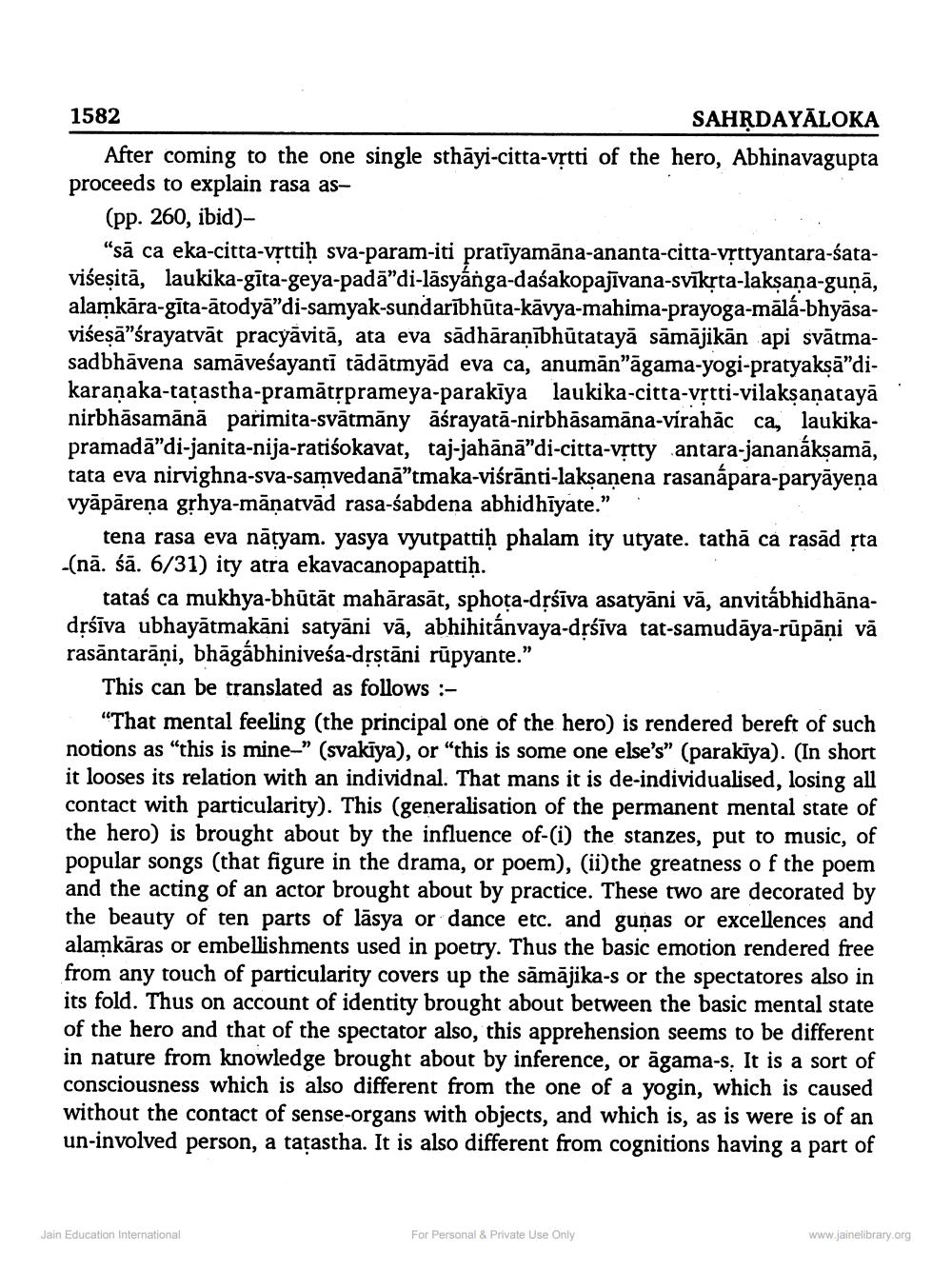________________
1582
SAHRDAYĀLOKA After coming to the one single sthāyi-citta-vịtti of the hero, Abhinavagupta proceeds to explain rasa as
(pp. 260, ibid)
"să ca eka-citta-vșttiḥ sva-param-iti pratīyamāna-ananta-citta-vșttyantara-sataviśeşitā, laukika-gīta-geya-padā”di-lāsyánga-daśakopajīvana-svīksta-lakṣaṇa-guņā, alamkāra-gīta-ātodyā"di-samyak-sundarībhūta-kavya-mahima-prayoga-mālá-bhyāsaviśesā”śrayatvāt pracyāvitā, ata eva sadhāraṇībhūtatayā sāmājikan api svātmasadbhāvena samāveśayanti tādātmyād eva ca, anumān"āgama-yogi-pratyaksā"dikaranaka-tatastha-pramātrprameya-parakiya laukika-citta-vrtti-vilaksanatayā nirbhāsamānā parimita-svātmāny aśrayatā-nirbhāsamāna-virahāc ca, laukikapramadā"di-janita-nija-ratiśokavat, taj-jahānā”di-citta-vrtty antara-jananáksamā, tata eva nirvighna-sva-samvedanā”tmaka-viśrānti-laksanena rasanápara-paryāyeņa vyāpāreņa gļhya-mānatvād rasa-śabdena abhidhīyate."
tena rasa eva nātyam. yasya vyutpattiḥ phalam ity utyate. tathā ca rasād sta -(nā. śā. 6/31) ity atra ekavacanopapattih.
tataś ca mukhya-bhūtāt mahārasāt, sphoța-dịśīva asatyāni vā, anvitábhidhānadrśīva ubhayātmakāni satyāni vā, abhihitánvaya-drśīva tat-samudāya-rūpāņi vā rasāntarāņi, bhāgábhiniveśa-drștāni rūpyante.”
This can be translated as follows :
"That mental feeling (the principal one of the hero) is rendered bereft of such notions as "this is mine” (svakiya), or "this is some one else's" (parakiya). (In short it looses its relation with an individnal. That mans it is de-individualised, losing all contact with particularity). This (generalisation of the permanent mental state of the hero) is brought about by the influence of-(i) the stanzes, put to music, of popular songs (that figure in the drama, or poem), (ii)the greatness of the poem and the acting of an actor brought about by practice. These two are decorated by the beauty of ten parts of lāsya or dance etc. and guņas or excellences and alamkāras or embellishments used in poetry. Thus the basic emotion rendered free from any touch of particularity covers up the sāmājika-s or the spectatores also in its fold. Thus on account of identity brought about between the basic mental state of the hero and that of the spectator also, this apprehension seems to be different in nature from knowledge brought about by inference, or agama-s. It is a sort of consciousness which is also different from the one of a yogin, which is caused without the contact of sense-organs with objects, and which is, as is were is of an un-involved person, a tatastha. It is also different from cognitions having a part of
Jain Education International
For Personal & Private Use Only
www.jainelibrary.org




